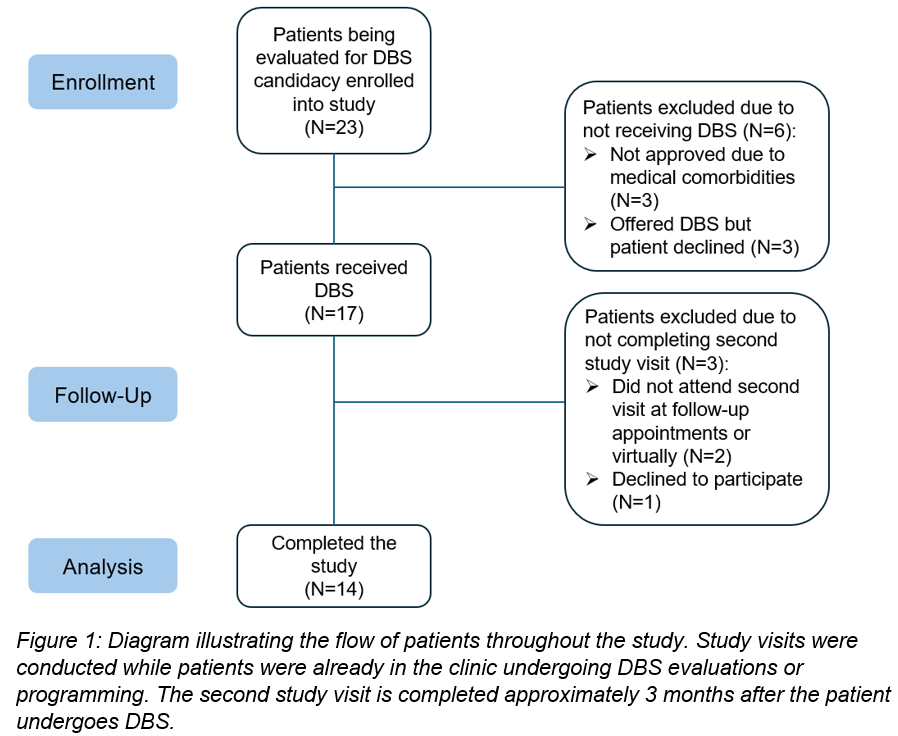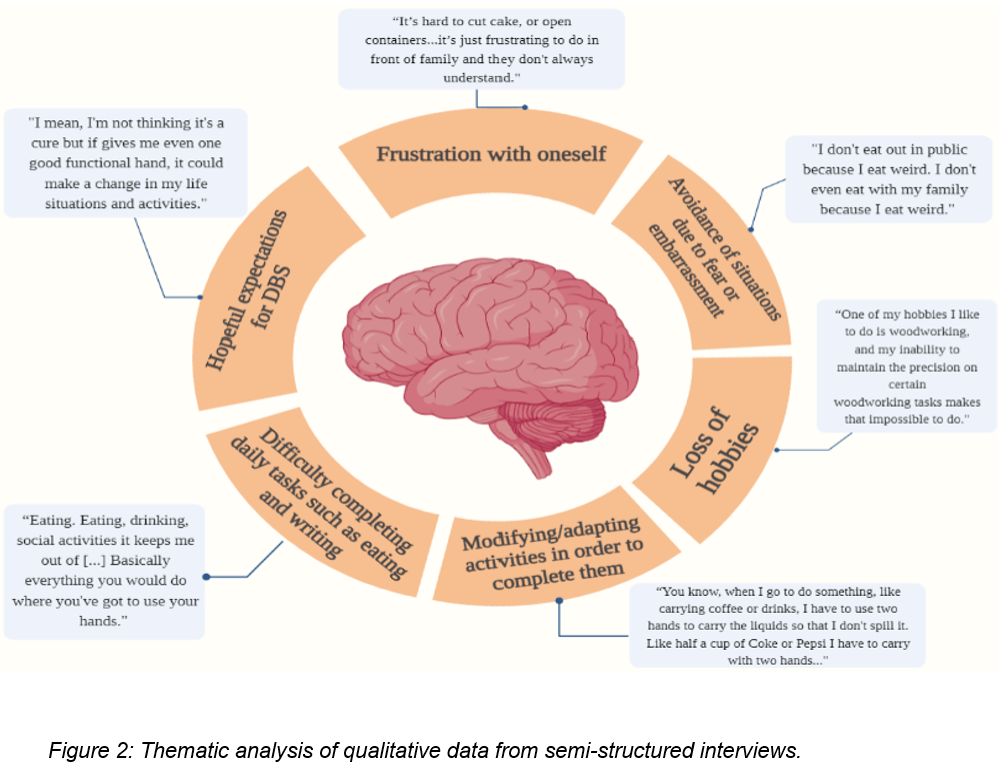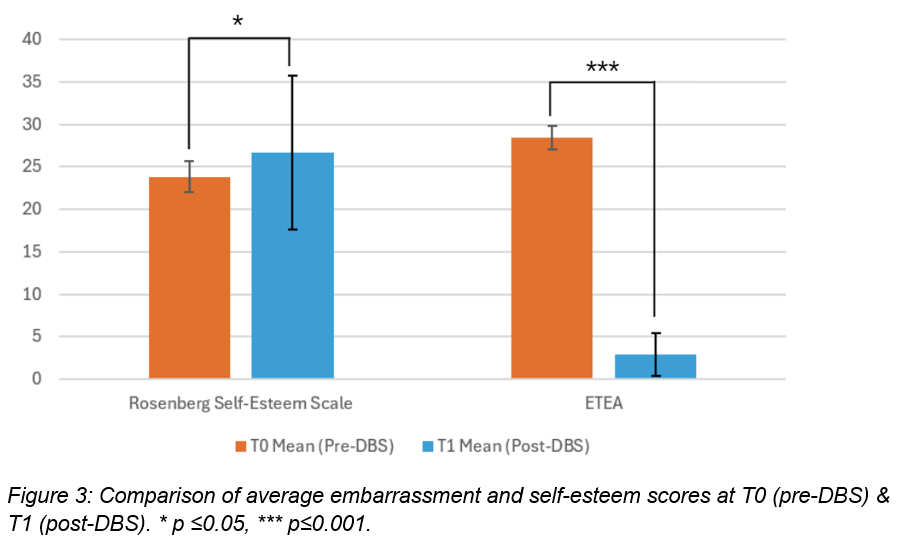Objective: To examine how Deep Brain Stimulation (DBS) influences embarrassment and self-esteem in patients with essential tremor (ET) and assess caregiver impressions.
Background: Social embarrassment is one of the reasons that patients with ET choose to have DBS surgery. However, studies have not explicitly evaluated how DBS influences embarrassment and self-esteem following surgery.
Method: This prospective survey-based cohort study assessed embarrassment and self-esteem in patients with ET (N=14) who were eligible to receive DBS. The Essential Tremor Embarrassment Assessment (ETEA), Rosenberg Self-Esteem Scale, and Bain and Findley Tremor Activities of Daily Living (ADL) scale were administered at two time points: before DBS (T0) and 3 months after DBS (T1). Semi-structured interviews were conducted at T0 & T1 and analyzed thematically. Clinical Global Impression (CGI) scales were administered at T0 & T1 to both patients and caregivers to assess how DBS influences perception of patient symptoms.
Results: Demographically, the average age was 69.6 years and 9/23 were female. The average duration of ET was 27 years and 80% presented with bilateral onset. At T0, patients were most embarrassed when eating, drinking, and writing. Caregiver perceptions of the patient’s quality of life were also poorer than patient impressions. Females had higher embarrassment (M=13.9, F=26.4, p=0.15) and lower self-esteem scores (M=22.8, F=20.0, p=0.27) compared to males. Patients with unilateral onset had significantly lower self-esteem compared to those with bilateral onset (unilateral=16.0, bilateral=22.6, p=0.011). Comparative analysis of T0 & T1 scores showed that after DBS patients had significantly less embarrassment (T0= 28.4, T1=2.9, p=0.000018) and higher self-esteem (T0=23.9, T1=26.6, p= 0.024). Thematic analysis revealed activity modification contributed to greater embarrassment and those with severe tremors were more likely to give up hobbies.
Conclusion: These findings emphasize how embarrassment impacts quality of life and provide greater insight into which features of ET are associated with higher levels of embarrassment and lower self-esteem. Comparative analysis shows the statistically significant impact DBS makes in improving patient’s self-esteem and embarrassment. Further analysis at T1 including that of caregiver impressions is ongoing.
Abstract presented at AAN Annual Meeting, 4/25/2023.
Diagram showing flow of patients throughout study.
Thematic analysis of qualitative data.
Comparison at T0 vs T1. * p ≤0.05, *** p≤0.001.
References: Louis ED, Gillman A. Factors associated with receptivity to deep brain stimulation surgery among essential tremor cases. Parkinsonism Relat Disord. Jul 2011;17(6):482-5.
Macchi ZA, Koljack CE, Miyasaki JM, et al. Patient and caregiver characteristics associated with caregiver burden in Parkinson’s disease: a palliative care approach. Ann Palliat Med. Feb 2020;9(Suppl1):S24-s33
Thomson CJ, Segrave RA, Racine E, Warren N, Thyagarajan D, Carter A. “He’s Back so I’m Not Alone”: The Impact of Deep Brain Stimulation on Personality, Self, and Relationships in Parkinson’s Disease. Qual Health Res. Dec 2020;30(14):2217-2233
Traub RE, Gerbin M, Mullaney MM, Louis ED. Development of an essential tremor embarrassment assessment. Parkinsonism Relat Disord. Dec 2010;16(10):661-5
Wilt JA, Merner AR, Zeigler J, Montpetite M, Kubu CS. Does Personality Change Follow Deep Brain Stimulation in Parkinson’s Disease Patients? Front Psychol. 2021;12:643277
To cite this abstract in AMA style:
A. Dave, J. Frey, J. Yu, J. Lopes, C. Hess. The Impact of Deep Brain Stimulation on the Embarrassment and Self-Esteem of Patients with Essential Tremor [abstract]. Mov Disord. 2024; 39 (suppl 1). https://www.mdsabstracts.org/abstract/the-impact-of-deep-brain-stimulation-on-the-embarrassment-and-self-esteem-of-patients-with-essential-tremor/. Accessed February 6, 2026.« Back to 2024 International Congress
MDS Abstracts - https://www.mdsabstracts.org/abstract/the-impact-of-deep-brain-stimulation-on-the-embarrassment-and-self-esteem-of-patients-with-essential-tremor/



